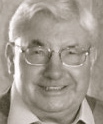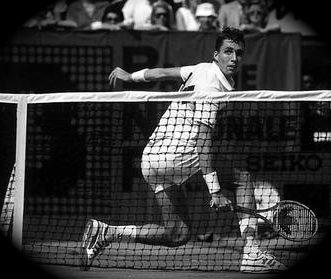**
 JOHN ROBERTS wrote for the Daily Express, The Guardian, the Daily Mail and The Independent, where he was the tennis correspondent for 20 years. He collaborated with Bill Shankly on the Liverpool manager’s autobiography, ghosted Kevin Keegan’s first book, and has written books on George Best, Manchester United’s Busby Babes (The Team That Wouldn’t Die) and Everton (The Official Centenary History).
JOHN ROBERTS wrote for the Daily Express, The Guardian, the Daily Mail and The Independent, where he was the tennis correspondent for 20 years. He collaborated with Bill Shankly on the Liverpool manager’s autobiography, ghosted Kevin Keegan’s first book, and has written books on George Best, Manchester United’s Busby Babes (The Team That Wouldn’t Die) and Everton (The Official Centenary History).
As Matthew Engel once wrote in the British Journalism Review: “I suspect posh-paper sports writing changed forever the day John Roberts left the Daily Express to join The Guardian in the late 1970s, was handed a piece of routine agency copy and picked up a telephone to start asking questions.”
.
.
By John Roberts
13 January 2012
Unlike Scotland’s First Minister Alex Salmond, the priority for Andy Murray, Britain’s leading tennis player, is to evolve rather than to devolve, to which end he recruited Ivan Lendl as his latest coach.
Seeking the missing ingredient in pursuit of a career-defining Grand Slam title, Murray goes into the Australian Open with the aid of a new mentor who experienced similar frustrations in major championships en route to becoming the ultimate professional of his generation.
Murray, defeated in the last two Australian Open finals and also in the final of the 2008 US Open, is 24 years old, the age at which Lendl broke free from a reputation as an under-achiever by winning the 1984 French Open after losing in four major finals. Lendl ended his career with eight Grand Slam titles and reigned as the world No 1 for a total of 270 weeks (157 consecutively).
As with Murray’s previous coaches, including Brad Gilbert, best known for the part he played in Andre Agassi’s success, Lendl will become little more than another face in the crowd when pre-match preparation is over and Murray is on the court, self-reliant, and the 51-year-old Lendl’s face is much fuller now than in his gaunt days on the tour, when everything about him was lean except his bank account.
Lendl mastered three of the four Grand Slam championships, but Wimbledon, where he twice reached the final, eluded him. His quest at the All England Club became a saga: How Green Was My Volley, though he was unfortunate to have played before the Wimbledon lawns lost some of their fizz with the introduction of rye-grass.
In common with Murray, Lendl played from the baseline, usually winning points with a fierce forehand. He was ultra-fit and set standards of determination and stamina that his successors, such as Boris Becker and Stefan Edberg, aspired to follow.
Born in Ostrava in the Czech mining region, Lendl was introduced to tennis by his parents, both of whom figured in the national rankings. After winning the Wimbledon junior title, Lendl joined the professional tour to face formidable rivals such as Bjorn Borg, Jimmy Connors and John McEnroe, and eventually became an American citizen A back injury caused him to retire as a player in 1994.
Last time we spoke, in 2008, Lendl told me: “The competition for us was not nearly as good as today. If John McEnroe and I entered the same tournament, say in Montreal, people would expect us to meet in the final. If you were not at your best, you’d still get to the quarters. Today, if players are not at their best they are out of the tournament. The gap between the top four and No 50 is much smaller.”
While Lendl will attempt to persuade Murray to be less passive, his own game certainly lacked Murray’s finesse, and he admitted that the sport had moved on.
“If you take players from my era to now,” Lendl said, “the game has changed and the players have many more shots. They use them differently than we did. The speed of the game has changed.”
One aspect that hasn’t changed is the decisive factor: the will to win when it matters most.
.










